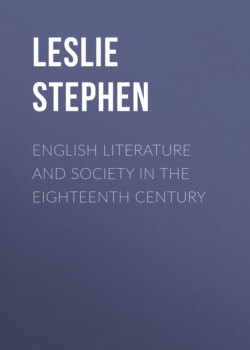English Literature and Society in the Eighteenth Century

Реклама. ООО «ЛитРес», ИНН: 7719571260.
Оглавление
Leslie Stephen. English Literature and Society in the Eighteenth Century
English Literature and Society in the Eighteenth Century
Table of Contents
TO HERBERT FISHER
NEW COLLEGE, OXFORD
PUBLISHERS' NOTE
ENGLISH LITERATURE AND SOCIETY IN THE EIGHTEENTH CENTURY
I
II
III
(1714–1739)
IV
(1739–1763)
V
(1763–1788)
Отрывок из книги
Leslie Stephen
Published by Good Press, 2019
.....
as Pope puts it; and when one remembers how through all the centuries the masters of thought and expression have appealed to men who knew nothing of criticism, higher or lower, one is tempted to doubt whether the critic be not an altogether superfluous phenomenon.
We may hold that the historian should confine himself to giving a record of the objective facts, which can be fully given in dates, statistics, and phenomena seen from outside. But if we allow ourselves to contemplate a philosophical history, which shall deal with the causes of events and aim at exhibiting the evolution of human society—and perhaps I ought to apologise for even suggesting that such an ideal could ever be realised—we should also see that the history of literature would be a subordinate element of the whole structure. The political, social, ecclesiastical, and economical factors, and their complex actions and reactions, would all have to be taken into account, the literary historian would be concerned with the ideas which find utterance through the poet and philosopher, and with the constitution of the class which at any time forms the literary organ of the society. The critic who deals with the individual work would find such knowledge necessary to a full appreciation of his subject; and, conversely, the appreciation would in some degree help the labourer in other departments of history to understand the nature of the forces which are governing the social development. However far we may be from such a consummation, and reluctant to indulge in the magniloquent language which it suggests, I imagine that a literary history is so far satisfactory as it takes the facts into consideration and regards literature, in the perhaps too pretentious phrase, as a particular function of the whole social organism. But I gladly descend from such lofty speculations to come to a few relevant details; and especially, to notice some of the obvious limitations which have in any case to be accepted.
.....